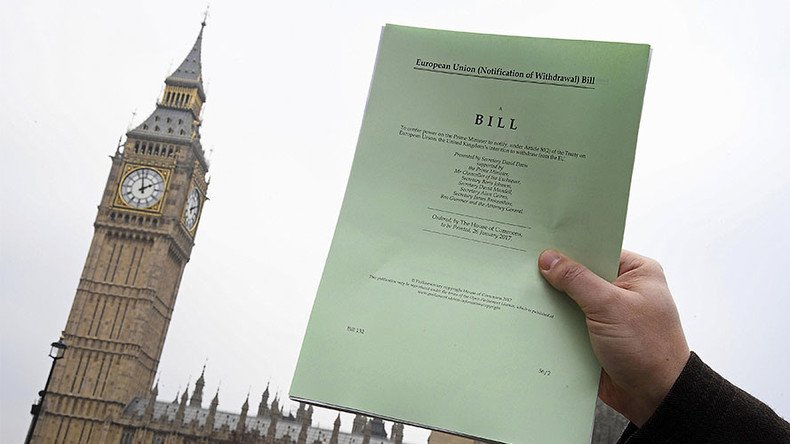Brexit trigger date 'confirmed' as MPs start 2-day debate on how to leave EU

MPs are beginning two days of debate on the bill to trigger Article 50, which will give Prime Minister Theresa May the go-ahead to launch formal Brexit negotiations with the EU.
The discussions on the European Union (Notification of Withdrawal) Bill, or ‘Brexit bill,’ will continue until midnight on Tuesday, with a vote taking place on Wednesday evening.
Ministers were forced to table the legislation last week after the Supreme Court upheld an earlier ruling that the government must obtain the approval of Parliament before it can begin negotiating Britain’s withdrawal from the EU.
The Liberal Democrats and the Scottish National Party (SNP) are expected to vote against the bill, but as the Labour leadership is backing it, the government is expected to win.
Labour leader Jeremy Corbyn has ordered his MPs to vote with the government, but some are expected to defy him.
May wants to pass the legislation by the first week of March, giving her the option to initiate the Brexit process at a summit of European leaders, the Times reports.
All 28 heads of government from EU members states will meet on March 9 at the two-day European Council summit in Malta, giving May an opportunity to invoke the clause then.
If Wednesday’s vote goes the government’s way, the bill will return to the House of Commons next week for the committee stage. The bill contains just two-tightly drawn clauses in an attempt to limit the scope for any amendments.
The bill is expected to pass through the Commons without any major amendments, according to the Guardian, as Tory rebels are backing away from supporting changes proposed by Labour and other opposition parties.
A band of Tory MPs fighting against a ‘hard Brexit’ are indicating they have been largely satisfied with May’s promise of a white paper, which could be published as early as Thursday.
BREAKING: Government releases Brexit White Paperhttps://t.co/Zp8H5AXolE
— RT UK (@RTUKnews) January 26, 2017
Labour and the Liberal Democrats now believe there is very little chance of getting enough cross-party votes for amendments.
They had hoped to win support on issues such as guaranteeing the rights of EU nationals, and a more meaningful vote at the end of the two-year negotiations or protections in the House of Commons.
Opposition parties are now concentrating on getting the government to concede points voluntarily, with Labour MPs believing the most likely proposal to be accepted is a demand for May to provide quarterly updates to Parliament on the process of negotiations.
The government remains confident that the bill will complete its passage through Parliament, including the House of Lords, in time for May to meet her March 31 deadline for invoking Article 50.
Speaking in Dublin on Monday, May said MPs would face a very clear choice when they came to vote on the bill.
“The people of the United Kingdom voted on June 23 last year. They voted in a referendum that was given to them overwhelmingly by Parliament,” she said.
“The people spoke in that vote. The majority voted to leave the European Union. I think it is now the job of the government to put that into practice.
“I hope that when people come to look at the Article 50 Bill they will recognize it is a very simple decision: do they support the will of the British people or not?”
Brexit secretary David Davis, who will pilot the bill through the Commons, said: “It is not a bill about whether or not the UK should leave the EU, or how it should do so.
“It is simply about implementing a decision already made, a point of no return already passed. We asked the people of the UK if they wanted to leave the EU; they decided they did.”













